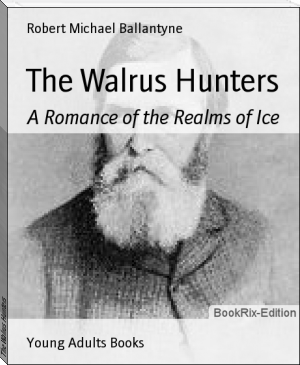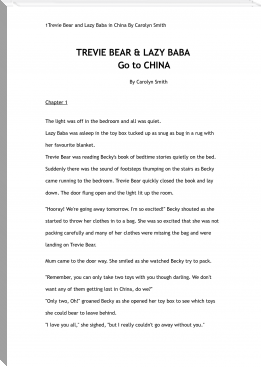The Walrus Hunters - Robert Michael Ballantyne (best book clubs .txt) 📗

- Author: Robert Michael Ballantyne
Book online «The Walrus Hunters - Robert Michael Ballantyne (best book clubs .txt) 📗». Author Robert Michael Ballantyne
The old woman chuckled, or rather "hee! hee'd!" a little and continued:
"Yes, Cheenbuk fought like a bear. We could not see him, for they were all on top of him at once, but hi! how he made them heave! I wonder they did not use their knives."
"They felt sure they had him," said her son, "they wanted to drive him to their huts and kill him slowly to amuse their women."
This was such a horrible idea that the old woman became unusually grave.
"These Fire-spouters are worse than white bears," she said, "for these never torture other beasts, though they often kill them."
"True, mother. Now I wish you would go away and leave my leg alone. Ondikik there needs your help. Go to him and hurt him as much as you please. I won't grumble."
"You were always a thankless boy--ever since you could speak," replied the dame, reproachfully.
"Did you ever hear of any one being thankless before he could speak?-- hoi! mother, you've tied it too tight. Slack it a little."
After complying with her son's request, old Uleeta went to Ondikik, to whom, however, she could render but little service, owing to the nature of his wound. Then she paid a visit to Rinka, whose injuries, however, proved to be more alarming than severe; after which she joined the rest of the tribe at supper.
While the Eskimos were thus proceeding to their home among the islands of the Arctic sea, the captors of Cheenbuk were paddling up-stream to the lands of the Dogrib Indians.
At first the stout Eskimo meditated an attempt to escape. Indeed he made one vigorous effort when they were leading him through the bush with his hands tied behind him. Just as they came to the place where the canoes were lying, the thought of home, and of his probable fate as a prisoner, pressed so heavily on him that he suddenly became furious, tripped up the man beside him with his foot, kicked over the one behind him with his heel, ran his head like a battering-ram into the back of the man in front of him, and then strove to burst his bonds with a succession of mighty wriggles, but, not being quite equal to Samson, he failed, and on seeing that two savages stood over him with drawn scalping-knives, while Magadar put the muzzle of a gun to his head, he deemed it wise to give in and uttered the exclamation "hoi!" with the air of one who feels that his game is played out. He marched forward after that in submissive silence.
On reaching the canoes, however, a fresh burst of indignation assailed him, and for a moment he meditated sending his foot through the bottom of the frail craft which was to carry him into exile, but on second thoughts he decided to delay the performance of that violent measure till they were well out in the middle of the current, when there would be the chance of drowning some of his foes as well as himself. By the time the desired position was reached, however, his spirit had calmed down a little and his philosophic mind--to say nothing of his heart--had begun to suggest the uselessness of gratifying his feelings by a revenge which he probably could not enjoy much while in the process of drowning, and, doubtless, could not enjoy at all after he was drowned.
Thus it came to pass that our hero restrained his passions, and, in process of time, found himself a prisoner in one of the lodges of the Dogrib Indians.
CHAPTER EIGHT.
IN THE HOUR OF NEED.
On reaching the Indian village Cheenbuk was firmly bound to a tree a little way outside the camp, and left there to his meditations, while his captors went to the old chief's tent to hold a council.
Meanwhile the women and children went to look at the captive. Among them were Adolay and her mother. The moment the former set eyes on Cheenbuk she recognised him as the youth who had rescued her mother from drowning the previous year.
"Mother," she whispered, drawing her parent aside, "that is him! Don't you remember him?"
"I think it is," returned Isquay, gazing steadily at the Eskimo, who looked at the crowd which surrounded him with a gaze of supreme contempt, though he did not by any means feel contemptuous.
"Come, mother," said Adolay, with sudden earnestness, "he has not recognised us in the crowd. I must go and find out what the braves are palavering."
As she spoke she drew her mother towards their own lodge, and there left her while she hurried on to the council-tent. In the shelter of some bushes she crept as near to it as possible.
There was no difficulty in making out what was said, for the warriors made no secret of their intentions, and spoke in loud tones.
"He shall die," was the remark of Alizay just as the girl came within hearing, "he has killed one of our braves."
"Ay, and he shall die by torture," said Magadar, who was a relation of the man that had been slain.
"Ho! ho!" exclaimed most of the warriors in tones of approval, but there were a few among them who were silent. They leaned to mercy's side.
"Better to spare his life and make a slave of him," said one of these, "we can keep him always tied like a bad dog till we need him; then we can loose his legs and make him drag our sledges."
"The brave who has spoken is young," said the old chief. "He does not know much about men. Will not the Eskimo watch for his chance, get free from his bonds, kill some of us when we are off our guard, and, perhaps, escape?"
"That is so. He must be killed," remarked Magadar, with a glance of scorn at the merciful youth, "and the sooner the better."
"Let us do it at once," said one of the blood-thirsty.
On hearing this the heart of Adolay beat anxiously, and for a few moments she was undecided whether to run to the tree to which the Eskimo was bound and set him free by cutting his bonds, or enter the council-tent, tell the story of his having saved her mother's life, and plead that the youth's might be spared. Both courses, she knew, were about equally desperate. If she were to follow the first, all the children would see her do it, and give the alarm, in which case the Eskimo would be pursued and certainly recaptured, for a fugitive in a strange country would have no chance with men well acquainted with every nook and corner of their native land. Besides which, she knew not what terrible punishment might be inflicted on herself for making such an attempt. On the other hand, for a woman to violate the sanctity of a council-tent was so unprecedented that she felt sure it would be sternly resented, and, therefore, useless.
Fortunately she was saved the necessity of acting on either alternative by the arguments of the next speaker, who was one of the blood-thirsty braves.
"Let us not be in haste like women and children," he said; "if we leave him bound to the tree all night he will have time to think of the fate that is coming, and we shall have good sunlight in the morning, which will enable even the oldest squaw to see well."
After some palaver it was agreed that the execution of Cheenbuk should be postponed to the following day, and that a sentinel should be posted beside him during the night to make sure that he did not manage to undo his fastenings and escape.
On hearing this decision arrived at, Adolay crept back into the bush and hastened to her mother's tent.
"They have fixed to kill him, mother," she exclaimed, anxiously, on entering.
"I expected that, and I'm sorry," returned Isquay, "but we cannot help it. What can women do? The men will not mind what I say. If only Nazinred was here they would listen to _him_, but--"
"Yes, they always listen to father," interrupted the girl, with an anxious frown on her pretty brows, "but as father is not here you must do what you can for the man."
"You are very fond of him!" said the squaw with a keen look at her daughter.
"Yes, I am very fond of him," replied Adolay with an air of unblushing candour, "and I think, mother, that you should be fond of him too."
"So I am, girl, so I am, but what can I do?"
"You can go and tell the story to the old chief. He is not hard, like some of the young men. Perhaps he may help us."
Isquay shook her head, but nevertheless agreed to try her influence with the old man, and went out for that purpose.
Meanwhile Adolay, who had not herself much faith in her mother's advocacy of the poor Eskimo's cause, resolved upon a separate course of action. Throwing a blanket over her head and shoulders, she started for the place where Cheenbuk stood, scornfully regarding the little boys who surrounded and insulted him by flourishing knives and hatchets close to his defenceless nose. They did not, however, dare to touch him, as the time had not yet arrived for actual torture.
Running forward, Adolay, who was a favourite with the young people, drove them back.
"Keep clear of him," she cried with a fierce glare in her eyes--which was wonderfully realistic, considering that it was a mere piece of acting--"I want to speak to him--to terrify him--to fill him with horror!"
This was quite to the taste of the wretched little creatures, who fell back in a semi-circle and waited for more.
"Can you understand my speech?" she demanded as she turned on Cheenbuk with flashing eyes.
The Eskimo thought he had never seen such magnificent eyes before, and wished much that they would look on him more kindly.
"Yes," he replied, "I understand a little."
"Listen, then," cried Adolay in a loud tone, and with looks more furious than before. "You are to die to-morrow."
"I expected it would be to-night," replied Cheenbuk calmly.
"And you are to be tortured to death!" At this the boys set up a howl of delight. At the same time the girl advanced a step nearer the captive, and said in a low voice hurriedly:
"I will save you. Be ready to act--to-night." The softened look and altered tone opened the eyes of the captive. Although the blanket partially concealed Adolay's face, Cheenbuk at once recognised the girl whose mother he had saved the previous spring.
"I am awake!" he said quietly, but with a glance of bright intelligence.
"Yes, you are doomed to die," continued Adolay, when the boys' howling had subsided, "and if you are to be tortured, we will all come to see how brave you are."
As she said this she went close up to the captive, as if to make her words more emphatic, and shook her little fist in his face. Then--in a low voice--"You see the cliff behind me, with the dead tree below it?"
"Yes."
"Run for that tree when you are free--and _wait_."
Turning





Comments (0)